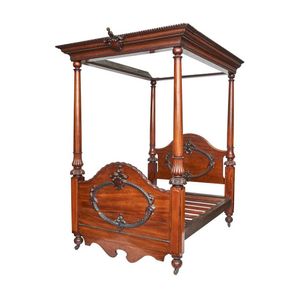Exquisite Australian Cedar and Rose Mahogany Four-Poster Bed
An impressive finely carved cedar and rose mahogany four-poster bed. Australian circa 1845. with cartouche to the top. provenance: The collection of Graham and Elizabeth Cocks Bonhams Sydney November 2012 lot 198. Reference:Kevin Fahy and Andrew Simpson Australian Furniture, Pictorial History and Dictionary 1788-1938 casuarina Press page 146 plate 8, foot-board 160 cm wide, canopy approx 180 cm wide Height?
You must be a subscriber, and be logged in to view price and dealer details.
Subscribe Now to view actual auction price for this item
When you subscribe, you have the option of setting the currency in which to display prices to $Au, $US, $NZ or Stg.
This item has been sold, and the description, image and price are for reference purposes only.
- Provenance - A term used to describe the provable history of an antique or work of art, and thus an additional aid to verifying its authenticity. Provenance can have an inflating effect on the price of an item, particularly if the provenance relates to the early settlement of Australia, a famous person, or royalty. Less significant are previous sales of the item through an auction house or dealer.
- Casuarina - Casuarina, is also known as beefwood (because of its appearance) she-oak, swamp oak, river oak, forest oak and Botany Bay wood. It is a native Australian hardwood, red brown in colour with dark flecks.
- Mahogany - Mahogany is a dense, close grained red-coloured timber from the West Indies and Central America. It was first imported into Europe in the the early 18th century and its use continued through the 19th century. It was popular for furniture making because of its strength, the wide boards available, the distinctive grain on some boards, termed flame mahogany and the rich warm colour of the timber when it was polished.. The "flame" was produced where a limb grew out from the trunk of the tree, and this timber was usually sliced into veneers for feature panels on doors, backs and cornices.
Some terms used to describe mahogany relate to the country from which it originally came, such as "Cuban" mahogany, "Honduras" mahogany etc. However unless the wood has been tested the names assigned are more a selling feature, rather than a true indication of the timber's origin. - Circa - A Latin term meaning 'about', often used in the antique trade to give an approximate date for the piece, usually considered to be five years on either side of the circa year. Thus, circa 1900 means the piece was made about 1900, probably between 1895 and 1905. The expression is sometimes abbreviated to c.1900.
- Cartouche - An ornamental panel in the form of of a shield, oval or rectangular scroll with curling edges. It may be carved into the back of a chair or the top of a sideboard, or present on a piece of silver or jewellery, and contain the initials of the original owner, heraldic symbols, or some other inscription, such as the details of a presentation.
In ceramics the term defines the central area of a vase or similar with a decorative border in one of the shapes above, into which a decorative scene or figures have been painted.
This item has been included into following indexes:
-
beds, material
- cedar 41
- mahogany and walnut 108
- beds, type - four poster, tester and canopy 61
